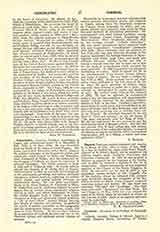

Capocci, GAETANO, musical composer and maestro, b. in Rome, October 16, 1811; d. there, January 11, 1898. As a boy he studied the organ under Sante Pascoli, organist of St. Peter’s, Rome, and he completed his musical studies under Valentino Fioravanti and Francesco Cianciarelli. In 1831 he was granted a diploma as organist by the Academy of St. Cecilia, and, in 1833, he received a diploma in the art of composition. Almost immediately he was appointed organist of the Church of Sta Maria Maggiore, in 1839. So successful was he that in 1855 he was appointed maestro direttore of the Cappella Pia of the Lateran, where he labored with conspicuous distinction during the remainder of his life. Solely devoted to church music, Capocci composed numerous masses and motets. He also wrote two oratorios, “Battista” and “Assalonne”. His chief fame rests on his “Responsori” for Holy Week. His son Filippo (b. May 11, 1840) has even eclipsed the fame of his father, whom he succeeded as maestro at the Lateran in 1898. Both as an organist and composer he ranks high.
W. H. GRATTAN-FLOOD

